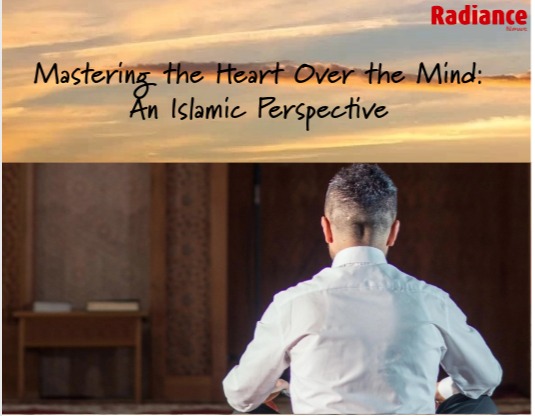– Ayesha Sultana
In the journey towards spiritual enlightenment and inner peace, mastering the heart over the mind holds significant importance in Islam. Rooted in the teachings of the Quran and the practices of Prophet Muhammad ﷺ, this approach emphasizes the cultivation of emotional intelligence, self-awareness, and a deep connection with the Divine.
Recognizing Your Emotions
The Quran urges believers to reflect on their emotions and responses to various situations. Allah emphasizes in Surah Al-Hujurat (49:11) the importance of avoiding ridicule and insults, promoting empathy and understanding among people. Recognizing our emotions allows us to address them with wisdom and patience, aligning our actions with the teachings of Islam.
Practicing Mindfulness
Islam encourages mindfulness through remembrance of Allah (dhikr) and regular prayer. Prophet Muhammad ﷺ emphasized the importance of being present in the moment and maintaining awareness of our thoughts and actions. By immersing ourselves in prayer and supplication, we strengthen our connection with the Divine and cultivate a mindful way of life.
Embracing Emotional Regulation
In times of difficulty and hardship, Islam teaches believers to rely on Allah and exercise patience (sabr). Surah Al-Baqarah (2:286) reassures us that Allah does not burden a soul beyond its capacity. Through prayer, seeking refuge in Allah, and trusting in His wisdom, we can regulate our emotions and find solace in His mercy.
Cultivating Empathy
Prophet Muhammad ﷺ exemplified empathy and compassion towards all beings. He taught that true faith involves loving for others what one loves for oneself. By understanding and empathizing with the emotions of others, we strengthen our bonds of brotherhood and sisterhood in Islam, fostering a community built on compassion and kindness.
Practicing Self-Compassion
Islam teaches believers to seek forgiveness and mercy from Allah and to extend the same compassion to themselves. Surah Az-Zumar (39:53) reminds us of Allah’s infinite mercy and forgiveness. By acknowledging our flaws and weaknesses, we can seek repentance and strive for self-improvement without succumbing to despair.
Setting Healthy Boundaries
Respecting boundaries is essential in Islam, both in personal relationships and interactions with others. Prophet Muhammad ﷺ emphasized the importance of treating others with respect and dignity. By setting and honoring healthy boundaries, we cultivate mutual respect and foster harmonious relationships based on Islamic principles.
Seeking Support
Islam encourages seeking knowledge and guidance from scholars and righteous individuals. Surah An-Nahl (16:43) emphasizes the importance of consulting knowledgeable sources for guidance. Seeking support from trusted mentors and advisors can provide invaluable insights and assistance in mastering the heart over the mind.
Reflecting and Learning
Self-reflection is integral to spiritual growth in Islam. Surah Al-Hashr (59:18) reminds believers to reflect on their actions and intentions. By regularly evaluating our deeds and seeking repentance for our shortcomings, we can strive for continuous self-improvement and spiritual elevation.
Living Authentically
Sincerity and honesty are fundamental values in Islam. Prophet Muhammad ﷺ taught that deeds are judged by their intentions. Living authentically entails aligning our actions and intentions with the teachings of Islam, striving for sincerity in all aspects of our lives.
Practicing Patience
Patience (sabr) is extolled as a virtue in Islam and is considered a means of attaining success and contentment. Surah Al-Baqarah (2:155) reminds us of the rewards of patience in times of trial. By trusting in Allah’s wisdom and exercising patience in adversity, we can overcome challenges and master our emotions with steadfastness and resilience.
In conclusion, mastering the heart over the mind in Islam involves cultivating emotional intelligence, self-awareness, and a deep connection with Allah. By embodying the teachings of the Quran and following the example of Prophet Muhammad ﷺ, believers can attain inner peace, spiritual fulfillment, and harmony in their lives.




